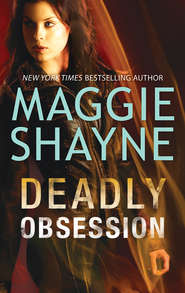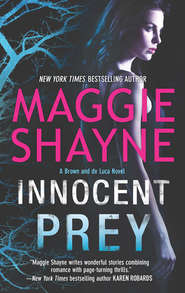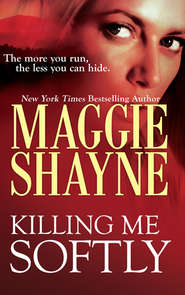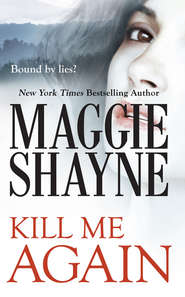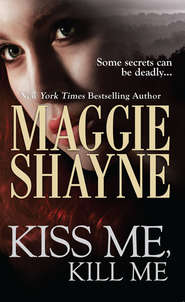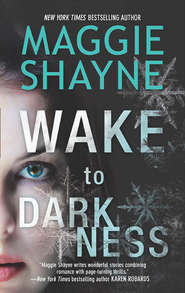По всем вопросам обращайтесь на: info@litportal.ru
(©) 2003-2025.
✖
Darker Than Midnight
Настройки чтения
Размер шрифта
Высота строк
Поля
He moved closer, wondering if the woman could have deliberately left it outside for him to discover, but he found that hard to believe. More likely it was bait of some kind. Surely, by now they’d figured out the dead man in his hospital room wasn’t him. Surely, they would have alerted the authorities in this small town, and the word was out. Maybe by now she’d heard about him, and gone to Chief Parker to tell her about the stranger who’d spent the night under her roof. The cooler, left on her porch, could easily be meant to lure him in. They might be waiting, even now. He had no desire to deal with those officers again. They were less than gentle, those hometown boys in the Blackberry PD. At least, the one he’d dealt with back then.
His stomach growled and churned. He needed food. His body was at war with his brain. Hell, if he didn’t get physically up and running again, this entire mission was no more than one big waste of time.
He crouched in the trees across the street, watched the place for a while. Eventually an electric company truck rolled up. Men went around to the back, messed with the box mounted to the side of the house. They left again. Her power had been turned on.
He waited longer, kept watching the place. No movement. No sign of anyone nearby. Swallowing hard, he came out of his cover, and started moving across the street. He was slow, clumsy and wary. He told himself to turn and run at the first sign of a trap, but doubted he’d be able to outrun anyone. And then he heard a low, deep growl, and froze in his tracks.
The woman had a dog? He didn’t remember a dog from last night.
The growling grew louder, and he saw the animal’s large head emerge from underneath the broken boards in the porch. It barked at him once, twice, three times. River went stiff, looking around for people to come running, cops with guns drawn, at the dog’s summons, but none came. Maybe it wasn’t a trap, after all.
The dog came the rest of the way out; the barking ceased. It looked at him, growling deep, stepping forward, hesitant, wary.
River frowned, eyeing the skinny animal, the way his stomach seemed concave, and the familiar markings on his face. “Rex?” he whispered. Then louder. “Rex, boy? Is it you?”
The dog went still, head tipping to one side. It whined once.
“Rex, it’s me. God, boy, you look as bad I must. Come here. Come here, Rex.”
Tail wagging slightly, the dog came closer, wary and pausing between steps. River knelt down, right there in the road, and held out a hand. The German shepherd moved nearer, sniffing at him. Then, suddenly, the dog burst into a loud chorus of barks and jumped on him, paws to his chest knocking him flat on his back, tongue licking his face and neck.
River smiled. It hurt, pulling at facial muscles that hadn’t been used in months. Burying his hands in Rex’s fur, he hugged the dog, and wondered why he was feeling so damn emotional. It was an animal.
But he knew. Rex was a piece of his old life. The life he’d had before everything had been taken from him. The life he’d thought had been entirely obliterated. Rex remained. And if he did, then there was hope.
River pushed the dog off him, and then used his old friend to help pull himself to his feet. Keeping one hand on the animal, he moved across the road and into the driveway, trying to walk in the nicely plowed spots, where he wouldn’t leave obvious footprints. He went up onto the porch, then turned, realizing Rex was no longer beside him. The dog sat at the bottom of the steps. Too wary, perhaps, to come closer.
“It’s okay, pal. I’m pretty sure there’s no one around. Come on.” He slapped his hand against his thigh. Rex came up the steps and onto the porch, where he proceeded to explore and sniff the length and breadth, with special attention to the corners and the empty dog food dish that still held a few telltale crumbs.
She’d fed his dog.
River moved to the cooler, lifting the lid up and peering inside. “And now she’s feeding me,” he muttered.
Tupperware dishes lined the thing. He found one full of homemade rolls, and couldn’t stop himself from taking one. He bit into it, then felt Rex’s eyes on him, and saw the dog watching intently as he chewed.
“Okay, one for you, too, boy,” he said, tossing the dog a roll.
Rex caught it and ate it eagerly, tail wagging, while River examined the other containers. One held a stew, thick with gravy, vegetables and meat. Impossible to eat that, really, without utensils. The next dish he opened held cold fried chicken.
“God, Rex, I think I’ve died and gone to heaven.” He took out two pieces of the chicken and, forgetting his caution, sat right there on the porch to eat them. But before he got more than a bite off the second drumstick, his stomach was protesting. It had been too long. He just couldn’t hold food the way he would have liked to. Couldn’t do this meal justice.
There were other dishes in the cooler, and bottles of water, as well. He didn’t go through them, just peeled the remaining meat off the chicken bone for Rex, then put the bone itself back into the container, because he didn’t want the dog eating that, and set the container back in the cooler. He helped himself to a bottle of water, and only as he took his first sip did it occur to him that he hadn’t had a drop of water since before leaving the hospital—aside from the icy pond water he’d swallowed last night.
He drained the bottle, too thirsty, suddenly, to take it slow. And then his stomach convulsed and heaved. He ran off the porch, the dog at his heels, and only just made it into the thick brush across the road before he lost his lunch. The heaving left him weak and trembling, his stomach feeling far too queasy for him to even consider trying again to put food into it.
Rex nudged his thigh, whined a little.
He petted the dog’s neck and straightened. “It’s okay, boy. I’ll live. Maybe.” Lifting his head, he eyed the house. “You don’t suppose I could crawl under that porch with you, rest up for the day, do you?”
The dog barked once, and then the two of them made their way back across the street. River paused long enough to go through the box of clothing. Men’s clothing, all of it. There were jeans and flannel shirts, T-shirts and button-down shirts, ties, several pairs of shoes, and best of all, sweaters. Four of them, thick and heavy and warm. And a denim coat with a fleece lining, and even a knit cap.
“Heaven,” he said again. He took the jeans, T-shirts, sweaters, socks and the coat. He took only one pair of shoes, a pair of lined, waterproof boots that were more valuable to him right then than a million dollars would have been. He tried to arrange the remaining items—the dress shirts, ties, suit pants and jackets—in such a way that it wasn’t utterly obvious things were missing from the box. But it was pretty clear.
He bundled up his treasures, and went, with the dog, to the open spot under the porch, then knelt and crawled in.
And then he let his eyes adjust to the darkness. When they did, he realized that the woman who lived here was a pushover. There was a brand-new dog bed under the porch.
But there was something else even better. Something he had known about, once, but forgotten long ago. There was a hole in the cinder block foundation, made for a casement window. But there was no window in the hole.
He peeked through, into the house’s cellar. The furnace was running. The warmth of it touched his face.
He closed his eyes, told himself this woman was too nice to be treated this way. She didn’t deserve to have a confessed murderer, much less an escapee from a mental hospital, hiding out in her basement.
And yet he didn’t see that he had much of a choice in the matter.
He tossed the clothes into the basement, then went back to the porch to get the bottles of water, the chicken and the rolls from the cooler, and took those back with him. His list of earthly possessions was growing. He had clothes now. He had food and water, and he had shelter. He also had a knife with a six-inch, razor sharp blade and his assailant’s fingerprints, he hoped, preserved on the handle. He’d wrapped it in a rag he’d found along the roadside to keep the prints from being smudged. A plastic zipper bag would have been better.
This time, when he crawled underneath the porch, he kept on going, through the missing window, into the cellar.
Turning, he wondered if Rex would try to come in, too. If he did, and she came home, the dog would surely give him away. But Rex was happily curled up on his dog bed, already snoring.
Dawn came out of the laundry room with an overflowing basket of clothes. She tended to let her laundry pile up at the dorm, so she’d brought it all with her to wash during the holiday break. And this was the last of it.
Everyone had been watching her too closely today. It made her want to cut and run, but she kept reminding herself it was only because they cared about her. Still, the searching looks, the leading questions—it was wearing thin.
She walked through the living room with her basket of clothes, and felt the chill as soon as she entered the room. That chill—it wasn’t a normal one. It only came when one of them was close, and Dawn’s entire body tensed with anticipation.
Beth stood there, talking to a man as a woman stood nearby. The man was tall, slender, dignified looking and soft spoken. He had a worried look about him, and his shoulders nearly slumped from whatever weight they were carrying.
The woman…oh. Her again.
She was semisolid, her white nightgown stained with soot and black spots, as if it had been burned. So was her face, for that matter. One side of it was twisted and scarred. She held a baby in her arms, wrapped in a scorched, sooty blanket, and she stared. Not at Beth, or at the man, but at Dawn.
Dawn’s fear turned to anger. It was one thing for them to harass her, entirely another to get within a mile of her family. Screw this. She set the basket down on the floor and marched forward, making her stride aggressive and sending the dead woman a look meant to chase her off.
Beth turned, and Dawn plastered a more pleasant expression on her face, but not before Beth had seen her.
“You feeling all right, Dawn?”
“Fine,” she said. And she beamed a smile at the man who was looking her way.
“This is Dr. Melrose, Dawn,” Beth said. “He’s taking a room for a couple of days.”
“It seems silly, my living only an hour from here,” he said. “But then again, driving back and forth until my business in town is finished would be even sillier.”
“Dawn Jones,” she said, taking his hand, which was so icy it nearly made her pull hers away. “Welcome to the Blackberry Inn.”
“Thank you.”






